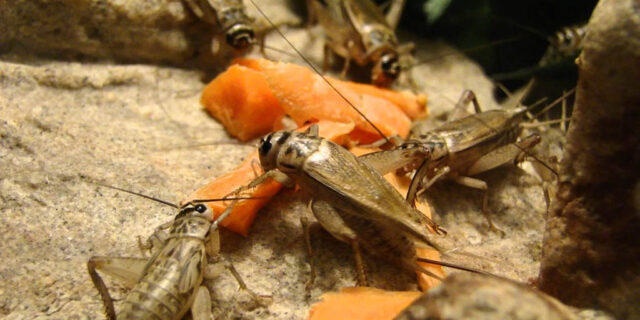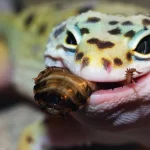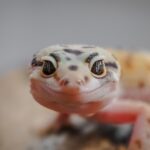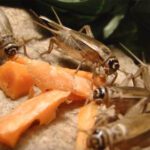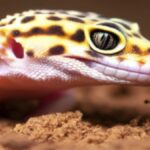Leopard geckos (Eublepharis macularius) are one of the most popular pet lizards kept worldwide. Their easygoing nature, modest size, and simple care requirements make them an excellent “beginner” lizard. However, that doesn’t mean their care should be taken lightly. Like all captive animals, leopard geckos have specific dietary needs in order to stay healthy. One aspect of leopard gecko nutrition that is often overlooked is gut-loading feeder insects. Gut-loading refers to enhancing the nutritional value of feeder insects prior to feeding them to your geckos. In this article we talk about Leopard gecko supplementation through gut-loading.
Table of Contents
Why Gut-load Feeder Insects?
In the wild, leopard geckos are insectivores, meaning they eat insects and invertebrates as their main food source. When kept as pets, we attempt to replicate their natural diet by feeding commercially-raised feeder insects like crickets, mealworms, waxworms and roaches. However, most feeder insects themselves are deficient in certain nutrients required by lizards and other insectivores. Simply put, feeding feeder insects “as is” provides inadequate nutrition for optimal leopard gecko health over time. This is where gut-loading comes in.
The concept behind gut-loading is feeding nutritious food to feeder insects to intentionally enhance their nutritional value before offering them to your leopard geckos. The goal is for feeder insects to eat this food and become “loaded” with more of the beneficial nutrients leopard geckos need. As your gecko eats these nutritionally-enhanced feeders, they receive a healthy diet that fuels growth, activity and natural behaviors.
Some key nutrients feeder insects are often deficient in include:
- Calcium – for proper bone/egg development
- Vitamin A – for vision, reproduction, growth
- Vitamin D3 – aids calcium absorption
- Vitamin E – supports a healthy immune system
In addition to vitamins and minerals, gut-loading aims to provide feeder insects with optimal levels of protein and beneficial fats for your leopard gecko’s nutritional needs.
Best Practices for Gut-loading Crickets & Feeders
The key to effective gut-loading is using appropriate gut-load food and properly preparing feeder insects. Here are some best practices:
Choose Nutrient-Rich Gut-Load Foods
- High-quality commercial gut loading formulas
- Finely ground quality dog/cat foods
- Fresh produce – dark leafy greens, carrots, sweet potato, squash, berries
Avoid Iceberg Lettuce
Iceberg lettuce is extremely low in nutrients. It provides feeder insects (and your leopard gecko) almost no nutritional value.
Provide Gut-Load Food 24/7
Continuously supply feeder insects with gut load food so it’s always available to them. Insects that go hours without food will empty their gut contents.
Gut-Load for At Least 24 Hours
It takes time for feeder insects to consume enough gut-load food to reap benefits. Gut-load crickets for a minimum of 24 hours before feeding off to your leopard geckos.
Have Gut-Load Food Accessible
Use shallow dishes, lids, or paper towels so insects can easily access the gut load food. Powdering food can also allow easier eating.
Keep Gut-Load Food Dry
Wet, spoiled food grows mold/bacteria and can make insects sick. Replace food becoming moldy or stuck together.
Supplement Gut-Loaded Insects
In addition to gut-loading, lightly dust insects with calcium + D3 supplement just before feeding to your leopard geckos 1-2 times a week.
Benefits of Gut-Loading
Here’s a summary of the major benefits of making gut-loading a standard practice for your leopard gecko:
Healthier Feeder Insects
Gut-loading improves the overall health of feeder insects, allowing them to be higher quality food sources.
Improved Nutrient Levels
Feeder insects contain more of the essential vitamins, minerals and nutrients leopard geckos need when gut-loaded effectively.
Prevents Nutritional Deficiencies
Providing properly gut-loaded insects helps prevent common health issues linked to poor nutrition like metabolic bone disease.
Supports Growth & Development
A nutritionally-balanced diet fuels proper growth and development – especially important for juvenile geckos.
Encourages Natural Behaviors
Good nutrition gives leopard geckos the energy and health they need to exhibit natural behaviors like hunting, exploring, etc.
The key is consistency. Make gut-loading a standard practice anytime you raise feeder insects for your leopard geckos. It takes some additional effort but pays off through healthier, more vibrant geckos. Monitor your gecko’s body condition and seek advice from an exotic vet if you notice possible signs of nutritional deficiencies or illness. Providing a variety of properly gut-loaded feeder insects is one of the most important things you can do as a leopard gecko owner. I sincerely hope you find this “Leopard gecko supplementation through gut-loading” article helpful.

